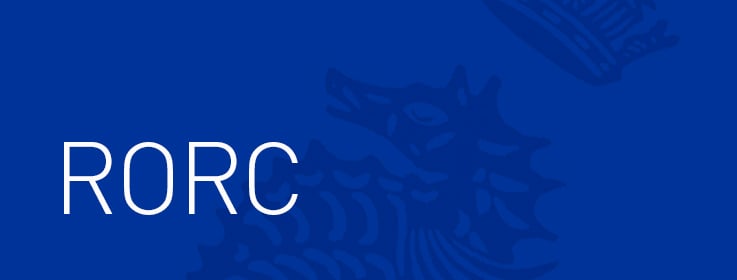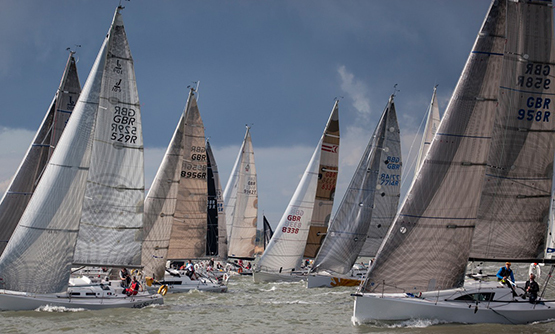Organised by the Royal Southampton YC, in conjunction with the Royal Ocean Racing Club, the second edition of the IRC Double Handed National Championship took place in the Solent, last weekend. 37 teams took part racing in three IRC Classes, lack of wind on the Saturday was the undoing of the passage race but two excellent races were held on the first day in the Central Solent.
Race Director Robert Lamb, sets the scene for the championship. “With high pressure dominating the south coast of England racing was delayed on Friday until a south westerly settled in after 4pm. Two races were then run: a laid marks 'sausage triangle’ followed by a round the cans race. Wind eventually strengthened to 10-12 knots to provide good racing. Saturday was disappointing with not enough wind to run the scheduled three hour passage race. So two races only were completed for the championship. All competitors were invited to the RORC Cowes Clubhouse for supper, which had a terrific atmosphere.”
IRC ONE
Won by Neil Martin's Sunfast 3600, Hot Cookie with Phil Barnes as crew. Runner up was Tim Octon's Corby 35 Njos, crewed by Rob Larke and third was Rob Craigie's Sunfast 3600, Bellino, crewed by Deb Fish. Hot Cookie won both of the races held and Neil Martin and Phil Barnes have been racing together for about ten years.
“Both Phil and I come from a dinghy background and we still race in dinghy events. We started sailing two handed together in my J/133 about nine years ago and the main reason for the change was that it is a lot of fun and we have lots more jobs to do! The J/133 was great offshore but we wanted about we could sail well inshore, so we initially sailed a J/97, then moved on to the Sunfast 3600, which is really set up for two handed sailing.
The important factors in coming out on top in the National Championship were teamwork and experience. We have been racing two handed together for a long time, we both know what to do in most situations and when things go wrong, we have a better chance of sorting them out. Having sailed a bigger boat previously, the sail handling is easier on a smaller boat. We have been sailing in the Solent now for about 10 yrs and we are beginning to get to know our way around.”
Phil Barnes was quick to point out that starting well was a key ingredient to winning inshore. “Neil typically gets a very good start, which in the short races gave us a big advantage being clear to implement our race strategy. Of all the racing I do, double handed yacht racing on short courses is a huge physical and mental challenge and the most rewarding sailing I have ever done.”
IRC TWO
The largest class racing at the IRC Double Handed National Championship had 15 yachts vying for the class and five yachts took podium positions. Race One was won by the defending champion, Paul Griffith's J/109, Jagerbomb, crewed by his son Mark. William Gough's J/109, Just So, crewed by Christian Jeffries was second and William Newton's J/105, Jelly Baby, crewed by Bill Darley was third. The winner of Race Two was Andrew Roberts' J/105, Jin Tonic, crewed by Bill Edgerley. Second was Mike Moxley's HOD 35, Malice, crewed by Huw Phillips and third was David Franks' JPK 10.10, Strait Dealer, crewed by Graham Sunderland. Jin Tonic's was the class champion by a single point from Jagerbomb with Strait Dealer taking third on countback from Jelly Baby.
“The Royal Lymington Yacht Club organised a series of double handed races back in 2011, and we decided to give it a go and much to my surprise I enjoyed the challenge of adapting a boat that is normally raced with a crew of 7 to one that 2 can handle.” commented Andy Roberts, skipper of Jin Tonic. “I quickly learnt that every manoeuvre took more time and more effort and they should be kept to a minimum.
Racing short handed means you are utterly dependent on your partner, their skills and input both tactical and navigational, as well as the sail handling. The boat needs to be prepared differently, simplify everything, so there was no umming and arring about sail calls, we just use what we have got, remembering that not having an extra 450 kilos of crew weight on the rail meant that the boat was tuned differently so that we could de-power much earlier than usual to keep the boat on it's feet and footing rather than crabbing sideways.
I think one of the things that helped us get a good result was having a clear strategy on the route we were going to take around the course so that we had no last minute panic moves to make, for example, dropping the spinnaker on the correct side for the next hoist. Spinning the kit when going upwind is seriously slow, losing at least half a knot of boat speed for 5 or 10 minutes.
We did not chose a J/105 for any other reason than there were three others in Lymington, yet we have found it to be a super boat for both short handed and fully crewed racing; easy to handle and always feels safe even when surfing along at 14 knots.
To summarise we felt we did well by keeping it simple, so we had time to focus on the race.A big thank you to everyone at the Royal Southampton YC, for all their hard work to give us such an enjoyable regatta.”
IRC THREE
Congratulations to Paul Dunstan and crew Tony Wrath, winners of Race One and runners up in Race Two, winning their class for the IRC Double Handed National Championship, racing Folkboat, Mandarin. Chris Charlesworth's Contessa 26 Meow, crewed by Martin Young, scored a third and a bullet to finish runner up by just a point. Dave Wright's H-Boat, Hubble Bubble crewed by Luke Bradley was third just a point ahead of David & Peter Cowell's Hanse 291, Seahorse.
The third edition of the IRC Double Handed National Championship will be organised by the Royal Southampton YC, in conjunction with the Royal Ocean Racing Club, held in the Solent in 2016, late summer or early autumn – watch this space.

































































